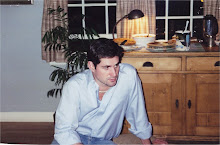
J. Alfred Prufrock is a character who is overwhelmed by anxiety, indecisiveness, and fear. He is afraid to confront a woman and declare his love, afraid of rejection. We can argue Eliot uses this "love" situation to illustrate mankind's fear of rejection in its search for a universal and spiritual love. Just like Prufrock, mankind has a fear of rejection, meaningless, and insignificance. It is better to not ask the "overwhelming question" (is there meaning/am i significant) than to ask the question and receive a curt rejection, or even worse, no reply at all, an empty echo in the emptiness of space. As a result of his fear, Prufrock does nothing at all but sit and watch time go by, "measuring (his) life with coffee spoons; he is paralyzed "like a patient etherized upon a table," "formulated, sprawling on a pin...wriggling on the wall." He lives a life of meaningless indecision and triviality rather than boldly search for love and meaning. The poem reflects Eliot's perception of modern civilization as a spiritual void, empty of faith and meaningful love, and paralyzed by anxiety and fear.

